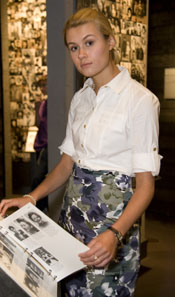
Credit: Courtesy of the Museum of Jewish Heritage
Members of Samuel Weiner’s family fled Germany in the 1930s,
immigrating to what was then Palestine just ahead of the Nazi rampage through
Europe. A close family friend survived the death camps, and the Rutgers senior
says he has been conscious of the unspeakable destruction the Holocaust wrought
since he was 5 or 6.
Corinne Burzichelli, a junior at Rutgers and daughter of a
Roman Catholic family, knew no one who was touched personally by Adolf Hitler
and his followers. It wasn’t until fourth grade, when the Bridgewater resident
picked up a copy of Number the Stars,
a young adult novel, that she learned of the murders of 6 million Jews and 5
million others at the hands of the Nazis.
Now Buzichelli and Weiner are immersed in Holocaust
education, with the goal of passing that knowledge on to the next generation.
As interns with Museum of Jewish Heritage – a Living Memorial
to the Holocaust, they have been hearing testimony from Holocaust survivors,
examining the museum’s exhibitions and artifacts, and attending seminars led by
international scholars.
Armed with new insights, they visited middle schools and
high schools throughout the state earlier this semester to give presentations,
and later shepherded their young charges through the museum for a compelling – often
intense – tour called “Meeting Hate with Humanity.”
“It was the first time at a Holocaust museum for many of
them, and there are sections of the museum where you can’t help be a little bit
horrified,” says Weiner, a resident of Paramus who is pursuing a double major
in Jewish studies and political science in Rutgers’ School of Arts and
Sciences.
The Lipper Internship
Program sends college students like Weiner and Burzichelli into schools
throughout the northeast United States with a message of tolerance and
co-existence. Betsy Aldredge, public relations manager for the museum,
estimates that the program has reached more than 48,000 young people in its 14
years of existence.
Samuel Weiner also interned at the museum.
“The interns are closer to the students’ age than the
teachers, and the younger people feel more comfortable asking them questions,”
Aldredge says.
The internships are open to undergraduates and graduate
students. Most tend to be majoring in history, communications, political
science, or Jewish studies, but any student at a college within a four-hour
driving distance to New York City is eligible.
Participants can choose to receive a stipend or apply the
experience toward academic credits. And while many of the interns are Jewish, the program includes a wide range of religions and ethnicities.
Hannah Johnson, a Rutgers junior from Branchburg with a
double major in history and Jewish studies, identifies herself as an
evangelical Christian. She served as a Lipper intern in the spring of 2011,
interacting with students in Manalapan, Keenesburg, and Passaic.
“The fact that the interns were such a mixed group added a lot of
dimension, because it allowed us to talk to fellow students our age who had a
direct connection to the Holocaust and with other people like me, who have no
connection but who know this is something that should never happen again.
“It’s not just a Jewish issue, it’s a human issue,” says
Johnson, adding that hearing firsthand stories from survivors as part of the
internship allowed her to personalize the impact of state-sponsored mass
genocide in the classrooms she visited.
“My students had definitely learned about the numbers before
we came, but we taught them about the personal stories. They heard the more
human side of things. In the middle schools, in particular, they had a lot of
questions – they wanted to know why, they wanted details. They were really,
really interested,” Johnson says.
For 2005 Rutgers graduate Amy Weiss, now studying for a Ph.D.
in history and Judaic studies at New York University, the internship was a revelation.
“Growing up, I personally had no immediate family connection
with the Holocaust. Going to Rutgers, getting a degree in Jewish studies, led
me to want to know more about it,” says Weiss, originally from New Providence.
“I’m driven by the philosophy of ‘Never again.’ The museum focuses on how we can
connect the lessons of the Holocaust to daily life – why, 60 to 70 years later,
are genocides still going on?”
She believes working at the Jewish heritage museum made her
a better teacher, preparing her to interact with students and field questions
on her feet. Five years after the internship, Weiss continues to lead groups of
middle and high school students through the facility several times a month.
For Burzichelli, the experience boils down to an adjustment
in her perception of the past and its relevance to the present.
“I used to think the Holocaust was about remembering those
who died,” she says. “Now I know it’s about keeping their memory alive.”


